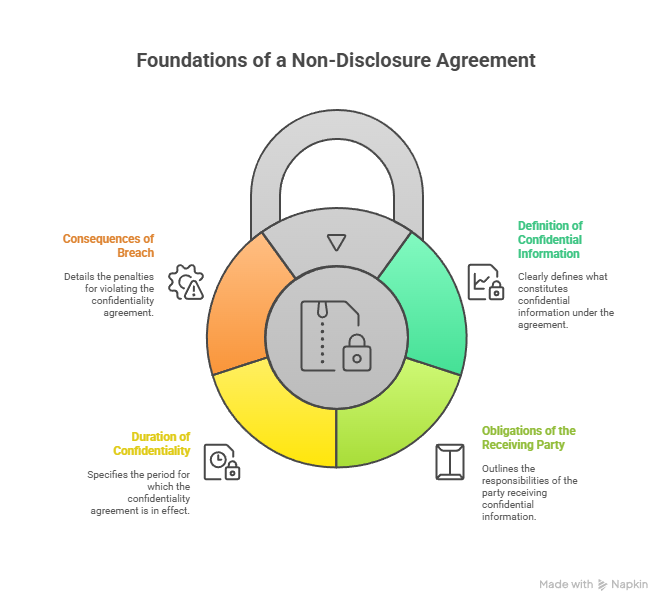Imagine this: you share your startup idea with a potential investor over coffee. You’re excited, passionate, and maybe a little nervous. A few months later, you see a strikingly similar product launched in the market — not by you, but by them. What went wrong?
This is exactly the kind of nightmare a Non-Disclosure Agreement (NDA) is meant to prevent. In today’s competitive business world, ideas, data, and strategies are often more valuable than physical assets. An NDA ensures that when you share confidential information, the other party is legally bound to keep it secret.
In this post, we’ll break down what NDAs are, how they work under Indian law, and when you really need one.
What is a Non-Disclosure Agreement?
A Non-Disclosure Agreement (NDA), also known as a confidentiality agreement, is a contract between parties where at least one party agrees not to disclose certain confidential information.

Types of NDAs
- Unilateral NDA: Only one party shares information, and the other is bound to confidentiality. Example: An employer sharing trade secrets with an employee.
- Mutual NDA: Both parties exchange sensitive information and agree to keep it confidential. Example: Two companies exploring a joint venture.
- Multilateral NDA: Three or more parties are involved, and at least one discloses confidential information.
Indian Legal Framework for NDAs
Unlike in some countries (such as the U.S., where trade secrets laws are codified), India does not have a standalone statute dealing with NDAs or trade secrets. Instead, NDAs are enforced under a combination of contract law principles, IT regulations, and intellectual property protections.
1. Indian Contract Act, 1872
- NDAs are treated as contracts. For an NDA to be valid, it must satisfy Section 10 (lawful consideration, free consent, lawful object, and not void under law).
- Breach of NDA → leads to remedies under:
- Section 73: Compensation for loss or damage caused by breach.
- Section 74: Compensation for breach of contract where a penalty or liquidated damages clause is specified.
- Courts usually award damages proportional to the actual loss, unless a specific penalty clause is included.
Simply inserting a huge penalty amount may not always be enforceable; it must be reasonable.
2. Information Technology Act, 2000
- Relevant particularly for digital data, electronic records, and cyber law compliance.
- Section 43A: Companies handling sensitive personal data are liable to pay damages if they fail to implement reasonable security practices and this results in wrongful loss/gain.
- Section 72: Imposes penalties for breach of confidentiality and privacy by someone who has access to personal data due to their official capacity.
3. Intellectual Property & Trade Secrets
- India does not have a dedicated Trade Secrets Act, so NDAs are the primary contractual mechanism to protect sensitive business information.
- Confidential information, if leaked, may sometimes be protected under:
- Copyright Act, 1957 – for original creative works (software code, documents).
- Patents Act, 1970 – if innovations are patented.
- Courts have recognized confidential information as an equitable right even in the absence of codified trade secrets law.
4. Arbitration & Conciliation Act, 1996
- Many NDAs include arbitration clauses for faster dispute resolution.
- If breached, disputes can be settled through arbitration instead of lengthy court processes.
5. Limits Under Indian Law
- Public Policy Test: Courts won’t uphold NDAs that are excessively restrictive (e.g., blanket bans on future employment, which amount to restraints of trade).
- Section 27 of the Indian Contract Act: Any agreement in restraint of trade is void, but reasonable confidentiality obligations are an exception.
- Overly broad NDAs that prevent an individual from using their general skills or knowledge are less likely to be enforced.
When Do You Really Need an NDA?
Here are some practical situations where NDAs are essential:
- Startups & Entrepreneurs
- When pitching ideas to investors or incubators.
- Protects business models, prototypes, and market strategies.
- Employees & Consultants
- Employers often use NDAs to safeguard client databases, internal policies, and product roadmaps.
- Especially relevant in the IT and BPO sectors.
- Mergers & Acquisitions (M&A)
- During due diligence, sensitive financials and company records are disclosed.
- Joint Ventures & Collaborations
- Businesses working together on research, technology, or market expansion should always sign NDAs.
- Freelancers & Service Providers
- Graphic designers, developers, and consultants handling sensitive client information must sign NDAs.
- Technology & Software Development
- Protecting source code, algorithms, and proprietary tools from being leaked or reused.
Key Clauses in an NDA
A well-drafted NDA is only as strong as the clauses it contains. Some must-haves include:
- Definition of Confidential Information: Specify what counts as confidential (trade secrets, client data, financials, etc.).
- Exclusions: Information already public or independently developed is not protected.
- Duration of Confidentiality: Confidentiality should survive even after the agreement ends (commonly 2–5 years in India).
- Jurisdiction & Dispute Resolution: Clearly mention Indian courts or arbitration as the chosen forum.
- Consequences of Breach: Damages, injunctions, or specific performance.
- Return/Destruction of Information: After termination of the agreement, parties must return or destroy sensitive data.
Common Mistakes to Avoid
- Using Generic Templates: Each NDA should be tailored to the specific relationship.
- Not Defining Jurisdiction: Without it, enforcement becomes tricky.
- Overly Broad NDAs: Courts may reject NDAs that unreasonably restrict trade or employment.
- Relying Solely on NDAs: They should complement other protections like copyrights, patents, and internal security measures.
Conclusion
An NDA might sound like legal jargon, but in reality, it’s a shield for your business ideas, data, and intellectual property. Whether you’re a startup founder pitching to investors, an employer hiring consultants, or a freelancer working on sensitive projects — having an NDA in place can save you from costly disputes later.




